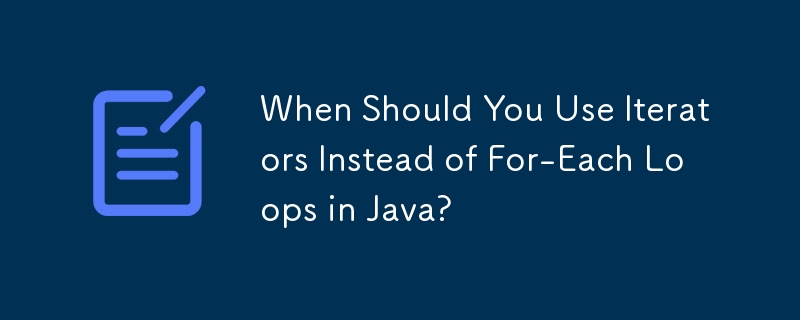
For-Each 循環與迭代器:效率注意事項
在Java 中,遍歷集合可以透過多種方式完成,其中一種正在使用for-each 循環或迭代器。比較它們的效率以做出明智的選擇是值得的。
For-Each 語法與迭代器
Java 5 中引入的新 for-each 循環語法是使用迭代器的專門快捷方式。在底層,它使用與傳統迭代器方法相同的迭代器介面來迭代集合。
當迭代器更有效率時
對於像迭代這樣的簡單操作集合並讀取其元素,for-each 循環和迭代器都提供相似的效率。但是,如果您需要對集合執行更複雜的操作,迭代器可以提供靈活性。
例如,如果您對集合中的每個元素使用帶有get(i) 的舊「c 風格」循環對於某些資料結構(如鍊錶),此循環的時間複雜度為O( n^2)。這是因為鍊錶的 get(i) 是一個 O(n) 運算。
另一方面,迭代器有一個基本要求,即 next() 應該是一個 O(1) 操作。因此,使用迭代器的循環將具有 O(n) 時間複雜度,明顯快於舊循環。
字節碼如何驗證它們的相似性
確認新的for-each 語法使用迭代器,您可以比較以下Java 片段產生的字節碼:
// For-each loop
for (Integer integer : a) {
integer.toString();
}// Iterator
for (Iterator<Integer> iterator = a.iterator(); iterator.hasNext();) {
Integer integer = iterator.next();
integer.toString();
}兩個片段產生的字節碼其實是相同的,這表示for-each循環本質上在內部使用迭代器。
選擇正確的方法
在探索集合時,使用 for-each 迴圈或迭代器之間沒有顯著的效能差異。但是,如果您需要在迭代過程中修改或刪除元素,或者需要對迭代過程進行更多控制,迭代器可以提供更大的靈活性。
對於大多數場景,for-each 循環語法就足夠了,並且通常是首選,因為其簡潔性和可讀性。它提供與傳統迭代器方法相同的性能,在保持效率的同時減少樣板程式碼。
以上是在 Java 中什麼時候應該使用迭代器而不是 For-Each 迴圈?的詳細內容。更多資訊請關注PHP中文網其他相關文章!




